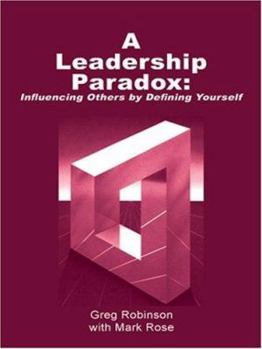A Leadership Paradox: Influencing Others by Defining Yourself
Select Format
Select Condition 
Book Overview
Times are such that organizations can no longer survive with leaders focused on telling others what to do and the rest of the organization allowing themselves to be taken care of by a leader.... This description may be from another edition of this product.
Format:Paperback
Language:English
ISBN:1418485152
ISBN13:9781418485153
Release Date:October 2004
Publisher:Authorhouse
Length:172 Pages
Weight:1.10 lbs.
Dimensions:0.6" x 5.9" x 8.9"
Customer Reviews
2 ratings
Valuable Nuggets Inside for Change Agents
Published by Thriftbooks.com User , 18 years ago
Robinson and Rose have written an interesting book that leaders and change agents should find valuable. There are examples and stories throughout that provide color on the theories put forth. While many of the concepts are straightforward and sometimes obvious, there is a theme on leader differentiation and emotional awareness/relationships that adds to the field. While I must admit that I often find a cover to cover read of most business book boring (i.e., rampant redundancy) and challenging (i.e., not enough time as a technology executive), I found A Leadership Paradox "helped" me though with a layout and formula that allowed me to see the relevant points from each chapter and then determine if I wanted to dive deeper into a topic. I recommend this book for those who want to understand all aspects of leadership in the complex business environments of today. For those looking for a discussion on how to create and lead change, it is a sound approach and contains nuggets of valuable insight sprinkled throughout.
Useful read
Published by Thriftbooks.com User , 20 years ago
One of the best things about the book is that I could see myself in the learning model the authors describe. The authors suggest that if we are intentional with our actions and aware of our assumptions, we can learn to better define ourselves and then indirectly influence the people around us to help them make better decisions. This is somewhat opposite of most leadership theories. I don't need to control others to make them do what I want. I can be an influence on them and still allow them to make their own decisions. The book uses several interesting examples of what the authors call differentiated or defined leaders. From NBA basketball coach Phil Jackson to the demise of apartheid in South Africa as well as personal examples from the authors, the book is based on two years of research using the learning model in a Fortune 500 company. The last two chapters provide some anecdotal research about how they used this in the company and what the results were. At times the writing is very theoretical, but with these examples, Robinson and Rose create an interesting case for leaders to loosen their grip and let go of control. Good read and worth the investment.






